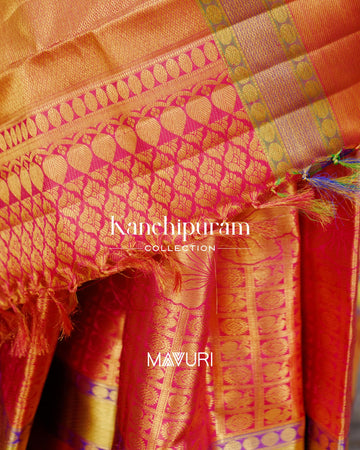
One of the most exquisite of silk sarees, the cost of Kanchipuram saree often varies from a few thousands to even in lakhs! This wide difference in price often depends on various factors, and it is important to understand them before you purchase your sari. Offering high durability, rich luster and a lush texture, these sarees are for keeps, and you must definitely have them in your wardrobe collection. Here are a few factors that determine the cost of your pure Kanchipuram silk sari.
The first factor that determines the sari’s cost is the yarn that is used in the weave. Kanchipuram sarees are woven with mulberry silk threads, the purity and quality of which drives the price. Therefore a sari woven with high quality silk threads in its weft and warp will cost you much higher than other versions. These include saris that come with a mix of cotton or rayon. Also known as blended silks, they cost you lesser than a pure silk. Kanjivaram saree.
Ranging from lightweight saris for regular usage to heavy saris for really special occasions, the weight of a Kanchipuram sari dictates its price as well. A sari that uses more of gold work or zari will weigh more and will also be more expensive. Heavy saris usually translate to mean higher degree of workmanship and higher costs. Alternatively lightweight kanchipuram sarees will have lesser zari and are usually lesser in cost.
Plain saris that do not have a pallu or border rank at the basic design and will rank in the lower price range at any store. Then there are saris with simple contrast borders and pallu, or those with checks or temple borders that cost more than the plain but less as compared to those with butas and intricate motifs on the body of the sari. Such detailed saris take longer to weave and therefore they cost more.
A silk of choice for many South Indian brides, it is imperative that you choose the right piece from a trusted place. The place you purchase your sari from can define the price to a large extent. Available places of purchase tend to include the weaving villages and retail shops. Buying from an authentic store may feel expensive as compared to smaller stores. However, you can be assured of the quality of material, authenticity of the product and also the GI tag.
The work involved in making this handcrafted masterpiece is intensive. As Kanchipuram silk is a natural yarn derived from silk worms, processing the yarn for shine and longevity takes time. Then weaving each sari on the handloom can take from anywhere between one to four months. This is a tough process, as the special weave of Kanjivaram saris involves three shuttles and two people working on a loom. Additionally, the time taken due to design complexity also drives its price up. Intricate and extensive work on the border, pallu and body of the sari will define and determine its price. Motifs of flora and fauna and temple borders are quite popular in Kanjivaram silks, and are also usually more expensive.
This is another important aspect determining the price of your sari. Traditional Kanchipuram saris use pure gold and pure silver in their zari, and if you have inherited a sari from your mother or grandmother, the chances of it having pure zari are high. Even today these are available, and would be priced depending upon the amount of zari used and the workmanship. While the motifs of birds and animals are common on these saris, some artisans are so skilled that they have woven in stories of Ramayana and Mahabharata on these saris as well.
With each Indian state having its own varieties of silk sarees available, the Kanjivaram or Kanchipuram silk sarees from Tamil Nadu are much sought after. Going with a trusted seller is always a better option, as you can be assured of quality that not only you but also your future generations can enjoy. Also do keep in mind that while knowing the price range of Kanchipuram sarees and going with a budget is a good idea, let that not be your only criterion. Opt for a piece that you truly like in terms of color, design and feel, and you will definitely enjoy draping it more often.




